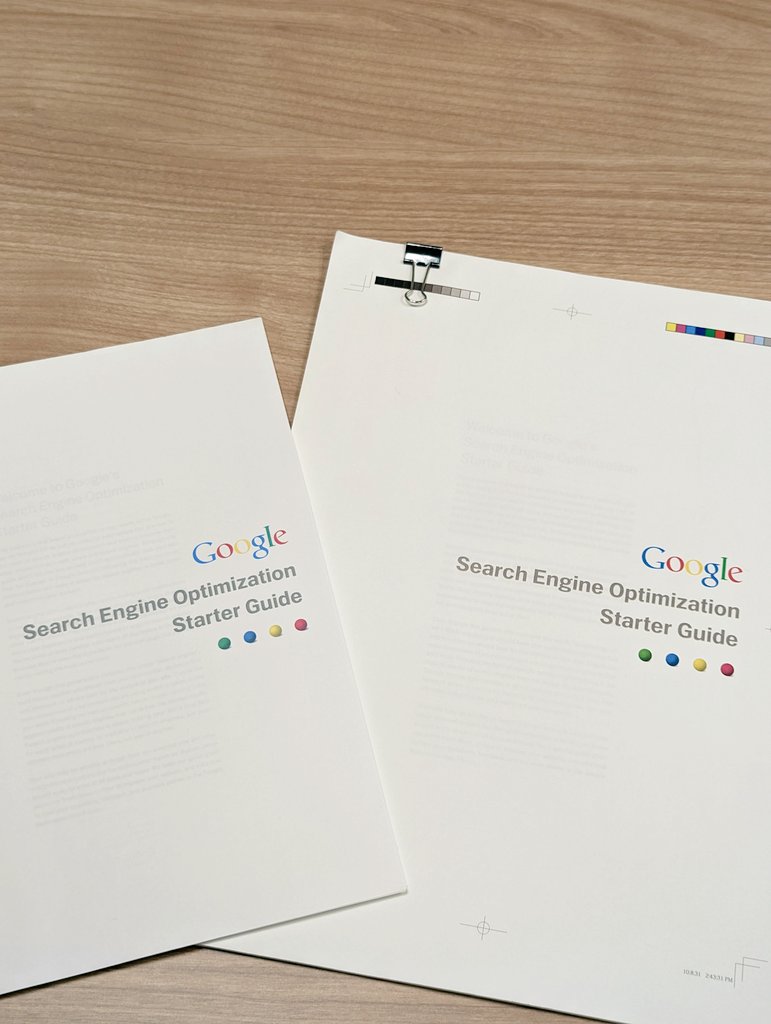Friday, February 2, 2024
We refreshed our SEO Starter Guide to better fit its namesake (you guessed it): a starter audience.

Print version of the SEO Starter Guide cca. 2014; credit to and permission fromTakeaki Kanaya, on x.com
Launched in 2008, this guide was originally a 22-page PDF that was designed to be a one-stop-shop for the most common SEO (short for search engine optimization) topics of the time. The PDF expanded to 40 languages, and then got modernized into HTML. Over the years, we also added more topics (but rarely removed anything), with each addition reflecting the general advice of a respective era (looking at you, mobilegeddon).
Today we're publishing a refreshed, more pocket-sized version of the SEO Starter Guide with a better focus on a starter audience and the topics we think a person who's just dipping their toes in SEO should focus on and why.
Better focus on the target audience
As the name suggests, the SEO Starter Guide is not actually for SEO professionals, but rather newish website owners and other content creators who would like to learn how to improve their content's presence in search results.
To better help our intended audience, we removed jargon and fluffy language (and just got to the point faster), compressed most sections to their core elements, and deleted a few sections entirely. We also focused our rewriting efforts on explaining terms and concepts in a more approachable way, and elaborating on the "why" behind a given topic or best practice.
We removed:
- Glossary section: Instead, explained the individual terms in context.
- Structured data section: It's a more of an advanced topic that starters don't have to think about; if someone is using a content management system (CMS) like Wix or Squarespace, they might try using a plugin and not have to worry about learning how to add code to their website.
- Mobile friendliness section: Most new sites and platforms are already mobile friendly.
- Analyzing site performance section: This is a next step and more of an advanced topic; likely, it's something to look into after understanding the basics and making a few changes on your site.
We compressed:
- "Are you on Google" sections: Simplified to one section that focuses on a quick way to check if your site is on Google, and on the first steps a site owner should take if they don't see their site in Google Search results.
- "Do I Need an SEO" section: We have a standalone doc; no need to repeat it. Compressed it into 2 sentences and linked out to the full guide.
- Title links and snippets section: Shortened considerably, in favor of the more comprehensive standalone docs.
- Images section: For a starter audience, alt text is the more important guidance. Those interested can learn more in the image best practices guide, if they are feeling adventurous.
- "Opt out of Google Search" section: While it's an important topic that should be mentioned, it's probably not why the reader is working their way through the guide.
- Links section: Compressed (without changing the message about them), and highlighted their useful aspects and why linking is helpful for users (and search engines).
- Promoting a site: Compressed and linked out toGoogle for Creators, as they have amore detailed guide on this topic.
- Site structure section: Largely kept it unchanged, however removed:
- Navigation section: Instead, focused on linking important onsite URLs more aggressively.
404section: Because we really don't care about404pages and site owners should just do whatever makes sense for their users.- Explicit setup for breadcrumbs: This is more of an advanced topic.
Newly added content
We tried our best to not add anything new, but some sections lacked an answer to "why should I do this" and "why is this thing not here". Far-from-groundbreaking, the additions are in theduplicate content section, which now elaborates on what is duplicate content and how to fix it (if that's even needed at all), and a new short section for videos (for parity with the images section).
We also added a new section about common SEO theories and ideas that we think people shouldn't focus on too much, and a new section abouthow long it can take to see impact. While we waffled a bit on whether it's a good idea to document anti-patterns and myths, in the end we added this with the intent of helping newcomers focus their efforts on areas that actually matter.
What's next?
The SEO Starter Guide rarely changes and we hope that it stays that way. However we do want to continue making our documentation clearer and easier to understand in the coming months. If you have ideas about which guide or topic we should prioritize, or you have feedback about the SEO Starter Guide (like releasing a bespoke leatherbound edition, or a full-cast audiobook recording), use the feedback button on this page.